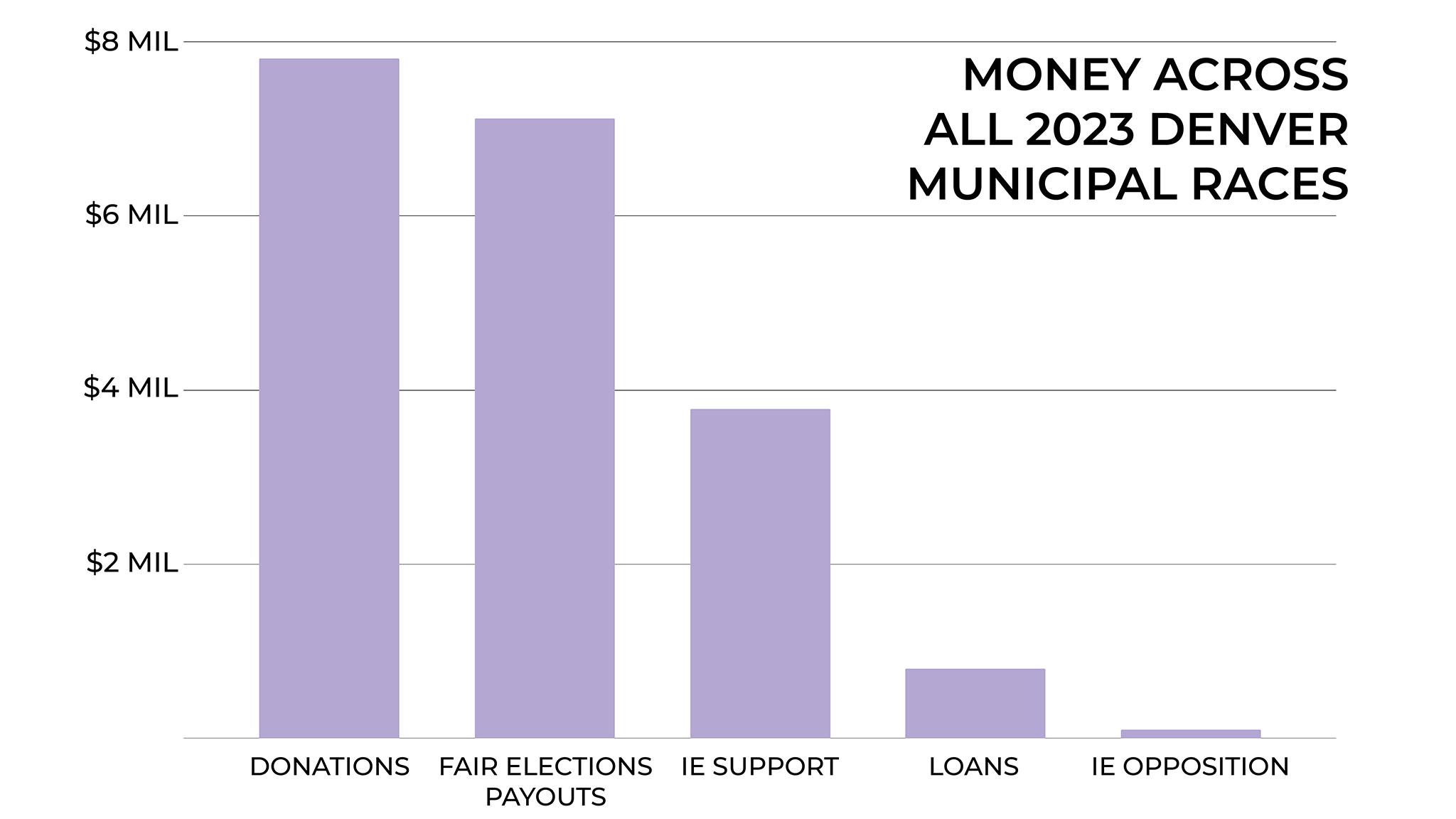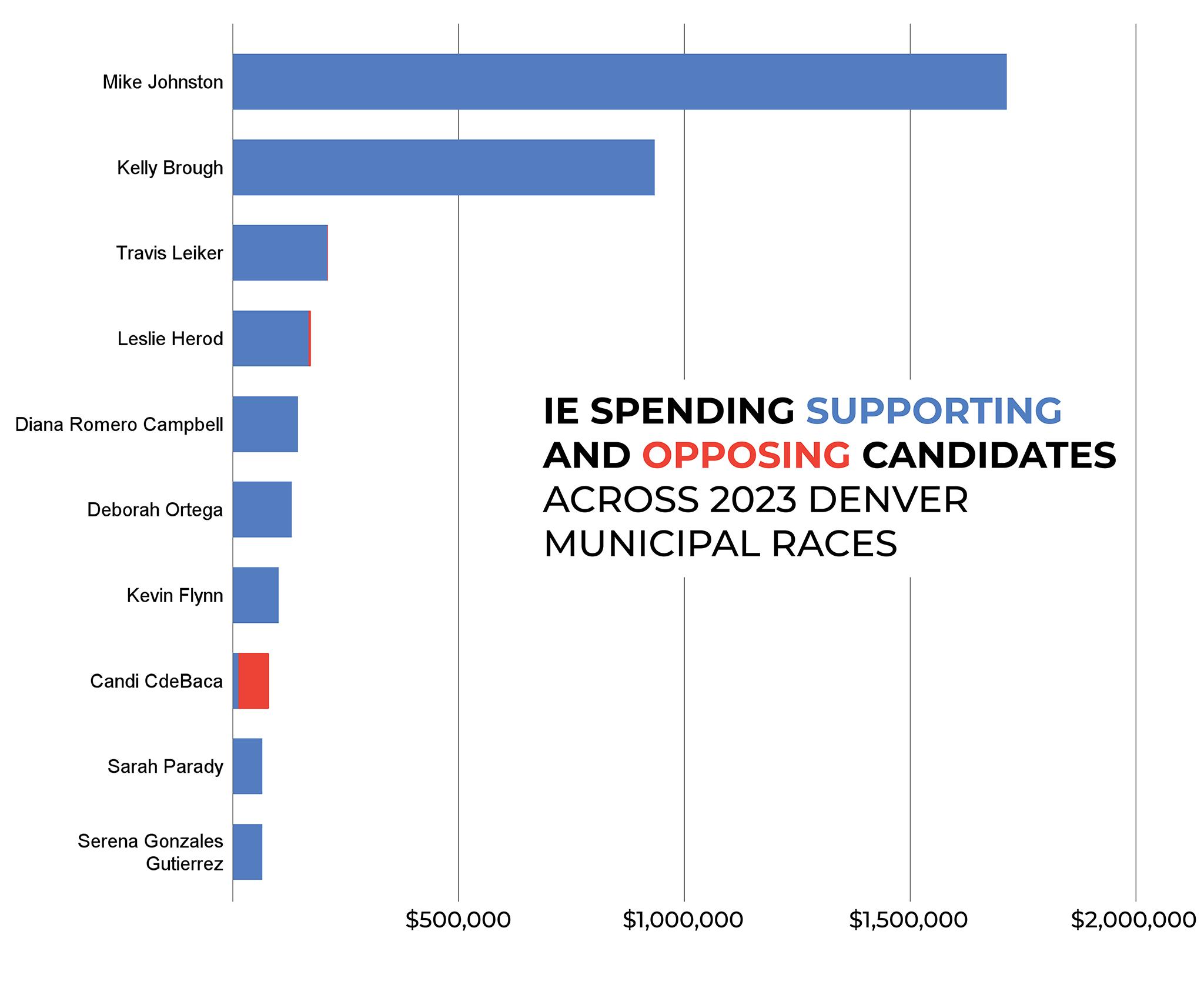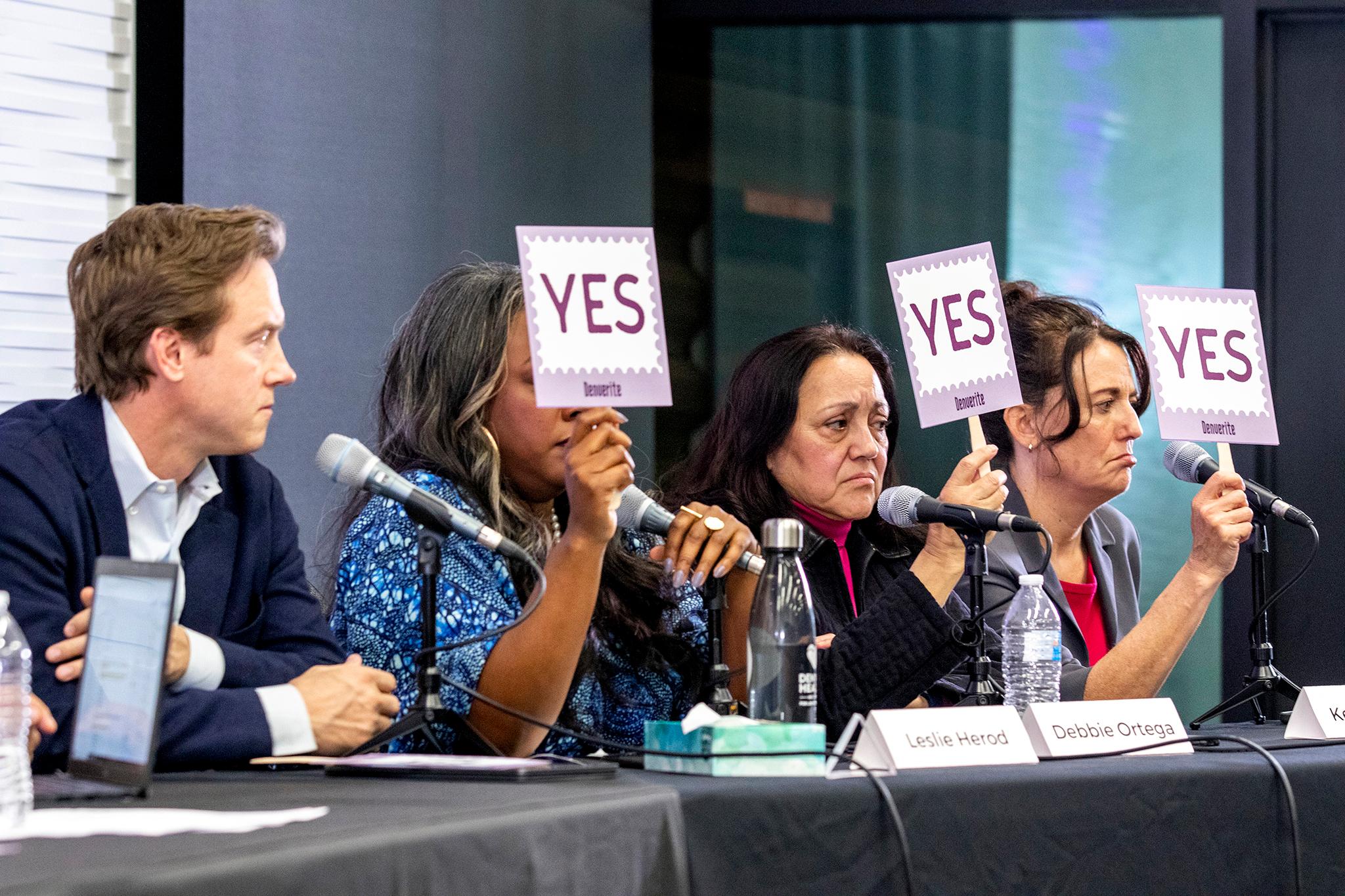As Denver approaches election day (April 4th!), money has poured into local races from a few outside groups. Independent Expenditure committees (IEs) have layered millions of dollars onto a substantial bedrock of donations and Fair Elections Fund (FEF) disbursements that have come in over recent months.
In particular, two candidates - mayoral hopefuls Kelly Brough and Mike Johnston - have received a ton of support from these groups. That got us thinking. Does this outside spending kind of diminish the Fair Elections Fund's egalitarian goals? Does it undermine the system?
The short answer is: Probably not, at least in the smaller City Council races. But independent support could become liabilities for grassroots candidates hoping the Fair Elections Fund would propel them into office.
Here's where IE spending is right now:
At the moment, about a dozen committees have spent more than $3 million on all of Denver's municipal races.
That's well below the $7 million in donations and $7 million in FEF matches that candidates have gathered. Still, it's worth noting that IE spending didn't really begin until February, as individual donations tapered off, and we'll likely see more spending for or against candidates and ballot issues in the next few weeks - especially if they go to runoffs.
Candidates Johnston and Brough have so far received $1,411,804 and $904,950 from independent expenditure committees, respectively, which accounts for more than 70 percent of IEs' total spending across all races.

To be clear, candidates are not supposed to have any coordination with IE committees.
They also could have more IE support than city data shows. IEs aren't required to register donations until that money has been spent. While some committees do report unspent donations, there could be more that we can't see.
There are 42 donors who've given more than $500 to IE committees. All but one of these big spenders have donated to two funds: "A Better Denver," which is behind Brough, and "Advancing Denver," which supports Johnston. A Better Denver's supporters include the National Association of Realtors and Brad Buchanan, CEO of the National Western Center Authority. Advancing Denver's supporters include Reid Hoffman, a co-founder of LinkedIn, and more.
IE committees have also dished out about $101,000 oppose candidates and ballot initiatives, which is about 3 percent of everything they've spent. About 75 percent of that was spent in the last week, which illustrates how quickly things are changing.
Of all opposition spending by IE committees, the most (nearly $70,000) has been directed at District 9 incumbent Candi CdeBaca. Two groups, "Citizens for a Safer Denver" and "A Safe and Prosperous Denver," each paid for digital ads and mailers against CdeBaca. This doesn't include a suite of mailers that went out against her in January, which were (probably) legally sent out without any documentation, due to the timing and content of their messages.
A group called "Save Denver Now" has spent a little less than $5,000 against Mayoral candidate Leslie Herod, who's also benefitted from $160,000 in positive IE spends.

So, does this undermine the whole egalitarian idea behind the Fair Elections Fund?
Candidates in quieter races say they've absolutely benefitted from the fund, both in terms of money and what it philosophically says about their campaigns.
Michael Hughes is hoping to unseat District 5 incumbent Amanda Sawyer, who did not opt-in to the FEF.
"It's been enormously important," he said of the fund. "It is mattering to people who I'm talking to on the doorstep."
While Hughes said Sawyer tried to ding him in a debate "for taking taxpayer money," voters he's met on the campaign trail have said his involvement in the program as an asset.
"There are a great many who are pleased to hear that I'm participating in it, and they don't like the idea of big money influencing this race," he told us. "I am essentially free of attachments and strings, and there isn't anyone who can call me and say, 'I donated to your campaign, now help me.'"
Note: Fair Elections Fund totals in this chart do not reflect the most recent (and final) disbursal, as those payouts are not yet included in Denver's election finance system. You can also click the image for an interactive version.
Beyond the fund's impact on optics, he said matching money has allowed him to spend more time knocking doors. We've heard the new system has elevated the importance of regular voters throughout this campaign season.
Hughes and other candidates also said the matching money helped them set up shop and start working in the first place.
"It definitely helped to just add more momentum," at-large candidate Will Chan told us. "It's not perfect, but I think it gave an opportunity for small, grassroots campaigns like mine to be viable. But at the end of the day, I think the inequities are still vast."
The FEF may have leveled a financial playing field, Chan said, but candidates with pre-built networks and free time to gather small, local and matchable donations still have an edge.
"The IEs are still there," he said.
Note: Fair Elections Fund totals in this chart do not reflect the most recent (and final) disbursal, as those payouts are not yet included in Denver's election finance system. You can also click the image for an interactive version.
Should the Fair Elections Fund have given more money to the bigger races?
Jordan Overstreet is a political advisor who's helping a handful of down-ballot candidates this cycle. Most people he's working with are running for City Council district seats. For them, he said, the FEF is probably doing what it's supposed to.
But Overstreet said at-large and mayoral candidates can't realistically fund their entire campaigns with small donors, even when that money is matched at a nine-to-one rate. Mayoral candidates can receive up to $750,000 from the fund, at-large candidates are capped at $250,000 and district candidates are capped at $125,000.
"You sill need to get in front of people, and $750,000 really doesn't go that far" in terms of advertising on TV and paying large staffs, he said. "For an at-large race, you're kind of at the cusp. You're running city-wide. You've got to communicate with the same amount of voters as the mayors, but with less money."
What this means, he said, is serious citywide candidates kind of need help from IE committees. On the other hand, Overstreet said he could see how big supportive spends from outside committees could hurt a candidate's brand, even while that money fills gaps in their strategies. Denver's electorate is smart and informed, he said.
Overstreets' own client, at-large candidate Travis Leiker, has benefitted from over $200,000 in independent spending supporting his run.
Note: Fair Elections Fund totals in this chart do not reflect the most recent (and final) disbursal, as those payouts are not yet included in Denver's election finance system. You can also click the image for an interactive version.
We asked both Brough's and Johnston's campaigns if they're worried about looking like they have corporate money behind them, but neither responded to our request for comment.
Owen Perkins, an advocate for election transparency and accessibility who pushed for the Fair Elections Fund's passage, said it's still too early to know how this will all shake out. It'd be one thing if an IE-backed candidate wins, he said, but there's no telling right now. Look at Mike Bloomberg's presidential run, he said. That guy spent a quarter billion dollars and still didn't get anywhere.
"It's so hard to tell until it's over, what it all adds up to. But the ideas are getting out there, and the voices are being heard," he told us. "You've got candidates, I think, who are breaking through in this election who wouldn't be otherwise, and I love having the choices we have right now. And some people, I can hear them rolling their eyes at the number of candidates, but I love it."












